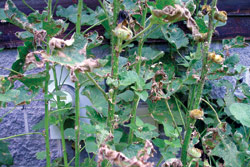I stand cross-armed, staring at my hollyhocks. It's July. They should be blooming gloriously, but they're not. Why? Garden pests — or, more precisely, weevils, which I thought preferred roots, not leaves. Still, a pest is a pest, no matter what part of the plant it attacks, and this tiny, barely discernible insect has turned the leaves of my lovely Alcea roseas into lacy, green skeletons. What's worse, the 7-foot-tall spires, seen from every south-facing window of my house, are bloomless.

Oh, the aggravation of it all.
This pesky problem must be teaching me a lesson, as my garden often does. Pests are everywhere, competing for food and water; hurting humans, pets and plants; and spreading diseases.
They're simply annoying.
I see parallels in other areas of my life, where anything from the merely irritating to the injurious can be pestlike. And some things can sneak up on you like the weevils.
Take my typical busyness, for instance. Each day, I awake with a desire to accomplish certain tasks, and I set to work. By day's end, I'm weary and feeling robbed: I know I spent my day doing something, and I often feel as though I did a lot. But my evening's fuzzy brain can't recall exactly what.
In the garden, we often spy the damage long before we spot the pests, yet I didn't. If you can identify the destruction, you can decide how to deal with the cause of it. Consider the function of their mouthparts, built for chewing and scraping (or, in the case of weevils, for piercing). They suck the plant's juices, leaving naught but skeletal leaves. If it weren't for my near-dead hollyhocks, I would find this whole thing interesting. Instead, it occurs to me that my mind-numbing busyness can be just such a pest, sapping the juice out of my life.
It can also keep me from practicing a certain due diligence. Pests often go for the weaker plants, so to keep your garden free of them, practice good sanitation. They also tend to hide in weeds. So healthy, weed-free gardens help avoid these problems.
But this means the gardener must work: Simply planting seeds or plants and hoping for the best won't do. You have to monitor conditions and water what you sow — without letting it become waterlogged. Plants must have the right soil conditions and receive the right nutrients. They must have proper airflow and the right amount of sunlight or shade. In other words, you must know your garden and tend to its needs.
Doing otherwise constitutes neglect, a dangerous pest that can cause serious harm to me and, more importantly, to my relationships. I live with three guys I completely adore (my husband and two sons). Maintaining healthy relationships with them will allow for some strain when the day comes (and it always does). To neglect their needs, their dreams, desires and hopes would be a risky thing. If I want happy relationships, I must tend to them, just as I must tend my garden. Neglect is a breeding ground for all kinds of pests that, once introduced, become impossible to eradicate, and the damage may be irreversible.
Some pests are predictable, like the Japanese beetles attacking my roses right now. I got the beetle bags out ahead of time: That's prevention. Other pests are sporadic, migratory or cyclical. It takes work to keep their numbers down to levels I can live with. Finally, there are potential pests that can devastate a garden. Think Mediterranean fruit fly. Its larvae make all manner of food unfit for human consumption; eradication is the only option.
I know this about my garden, but does it translate to my life? Am I prepared for those pests that are always going to be there? Do I know how to suppress the sporadic ones? What about those that cause irreparable harm? That's a lot to ponder on a slightly cool July day, but I hope the lesson isn't lost on me.
For now, my hollyhocks will stay. The weevils seem content to munch on them and leave the other perennials alone, so I'll sacrifice the infested Alcea roseas in hopes of preserving the rest of my plants. But I plan to be more diligent and less busy, keeping an eye out for signs of damage. After all, it's July, and the garden pests are rampant.
[Cinthia Milner lives in Leicester.]



Before you comment
The comments section is here to provide a platform for civil dialogue on the issues we face together as a local community. Xpress is committed to offering this platform for all voices, but when the tone of the discussion gets nasty or strays off topic, we believe many people choose not to participate. Xpress editors are determined to moderate comments to ensure a constructive interchange is maintained. All comments judged not to be in keeping with the spirit of civil discourse will be removed and repeat violators will be banned. See here for our terms of service. Thank you for being part of this effort to promote respectful discussion.